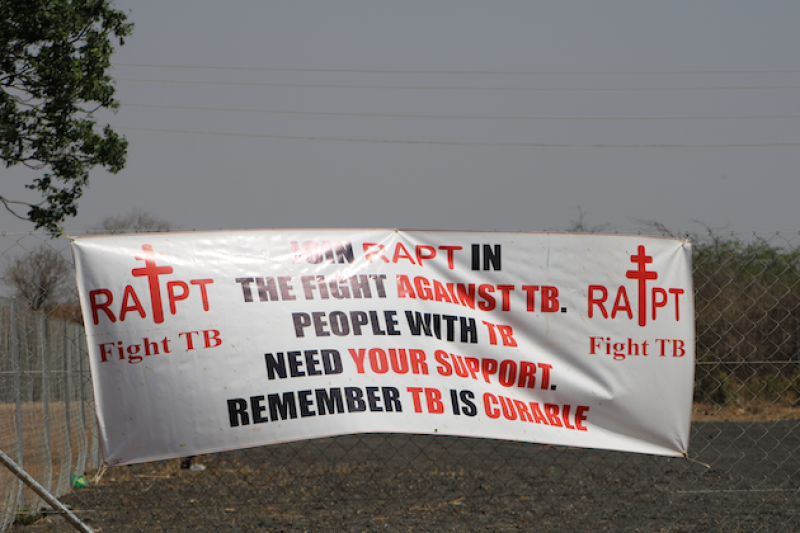- Israel Strikes Tehran with US Support Amid Nuclear Tensions |
- India Sees 9% Drop in Foreign Tourists as Bangladesh Visits Plunge |
- Dhaka Urges Restraint in Pakistan-Afghan War |
- Guterres Urges Action on Safe Migration Pact |
- OpenAI Raises $110B in Amazon-Led Funding |
Sweet Flavour Boosts Kids’ Fight Against Drug-Resistant TB

Rallying call to end TB by 2030.
Every day, Yondela Kolweni has to hold down her son, who screams and fights when it is time for his daily life-saving TB tablets — a painful reminder of her own battle with the world’s top infectious killer.
“It’s a fight I win, feeling awful about what I have to do,” says Kolweni (30), a Cape Town resident and TB survivor. “The tablets are bitter, and he spits them out most of the time. That reminds me of when I had to take the same pills.”
Kolweni’s five-year-old son is battling Multidrug-Resistant TB (MDR-TB), a vicious form of TB that is rising among children globally.
The global burden of MDR-TB among children and adolescents has increased from 1990 to 2019, particularly in regions with lower social and economic development, according to a recent study. The top three highest incidence rates of MDR-TB in 2019 were recorded in Southern sub-Saharan Africa, Eastern Europe, and South Asia. The highest death rates were recorded in Southern, Central, and Eastern sub-Saharan Africa.
South Africa is one of 30 countries that account for 80 percent of all TB cases worldwide and has the highest number of drug-resistant TB cases.
Kolweni’s son was diagnosed with MDR-TB five years ago after testing positive for TB, which had already affected his grandmother and mother. He was immediately placed on treatment — a drug cocktail that included moxifloxacin — a pill not for the faint-hearted.
“There were two medications he had to take, and there was one specifically — the yellow one — that he did not like. He recognised it by colour,” Kolweni told IPS, describing her daily struggle to get him to take the meds.
She often crushed the tablets, mixed them with water, and fed them through a syringe.
“We would sometimes hold him or wrap a towel around him so we could feed him the medication, but he would still spit it out. That meant he wasn’t taking the correct dosage,” said Kolweni. “We even tried hiding the tablets in his yogurt, but being a smart kid, he caught on and spat the medicine out.”
Moxifloxacin, an exceptionally bitter medicine, is a key drug in the new all-oral treatment for MDR-TB. This treatment combines Bedaquiline, Pretomanid, Linezolid, and Moxifloxacin, known as the BPaLM regimen. Although specially formulated for children, it remains a bitter pill to swallow.
But there is sweet hope. A new study by Stellenbosch University and the TB Alliance found that sweet, bitter-masked versions of moxifloxacin significantly improve children’s willingness to take the drug, easing the burden on parents and boosting treatment adherence.
Two new formulations of moxifloxacin were preferred by children over the existing generic products.
The results of the ChilPref ML study — a Unitaid-funded effort led by Stellenbosch University in collaboration with the TB Alliance — are expected to improve MDR-TB treatment and adherence in children.
Dr Graeme Hoddinott, principal investigator of the study, notes that children cannot be treated humanely for drug-resistant TB if the medicines taste so terrible that they refuse or must be forced to take them.
While children diagnosed with drug-sensitive TB have good outcomes within four months, as treatments are more child-friendly, the situation is much harder for MDR-TB. Most of the older drugs for MDR-TB have been replaced due to toxicity concerns, but the newer medicines still taste awful, Hoddinott explained.
“These drugs are incredibly bad-tasting; they’re genuinely awful — even adults who’ve taken extended TB treatment struggle to administer the same drugs to their children because the smell triggers memories of their illness,” he told IPS. “It’s a trauma for both the parent and the child.”
In the ChilPref study, nearly 100 healthy children aged 5–17 from two locations in South Africa evaluated the flavours using a ‘swish and spit’ method, ranking taste, smell, and other characteristics of each blend.
Children showed a clear preference for new flavour blends — bitter masker and orange (from Macleods), and strawberry, raspberry, and tutti-frutti (from Micro Labs) — over the commercially available options. For linezolid, no clear flavour preference emerged.
“Ensuring children have access to effective and palatable TB treatments is crucial for improving adherence and treatment outcomes,” said Koteswara Rao Inabathina, one of the study’s authors.
As multi-drug-resistant TB transmission increases among children and adolescents, developing new treatments is imperative, Hoddinott explained.
Moxifloxacin may also play a growing role in treating drug-susceptible TB, which affects around 1.2 million children annually.
Previously one of the most difficult diseases to manage due to limited child-friendly treatment options, drug-resistant TB treatment has advanced with new formulations, explained Dr Anthony Garcia-Prats, an author of the study.
“Now we’re making sure these medicines are appropriate for children, starting with what children and parents say matters most: taste,” he said.
RR/MDR-TB — defined as TB resistant to rifampicin alone or both rifampicin and isoniazid — affects an estimated 32,000 children under 14 annually. This discovery could improve medication adherence and help advance toward the UN Sustainable Development Goal of ending TB by 2030.
“It’s not a silver bullet,” Hoddinott cautions. “It doesn’t solve everything — these drugs still don’t taste nice, even with the improved flavours. But it’s a critical step forward.”
“My experience with TB medication wasn’t nice. For children, it’s worse. Flavoured tablets would help, like gummies. Every child loves flavours — even a suspension would be nice. My son would love it, and I’d have no trouble getting him to take his medicine.”

